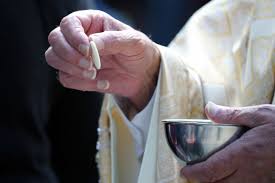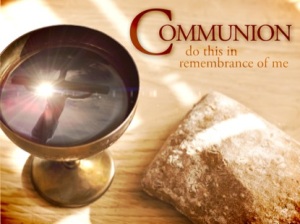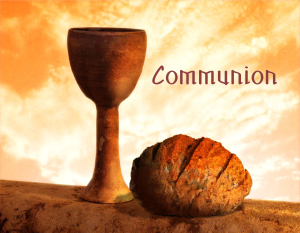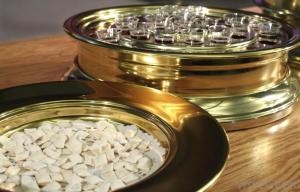
Communion. We get stuck in ruts debating the unimportant things. How often should we do it? Every time we meet? Just Sundays? Weekly? Monthly? Quarterly? Annually? Only Christmas and Easter?
And what should we use? Bread, cracker, leavened or unleavened? Wine, juice, grape drink or grape soda?
And what actually happens? Is it merely symbolism or is the Spirit present or is it a sacrament or is it mystical or transubstantial? Does it matter? Isn’t obedience more important than understanding all the minutia?

We could debate these sort of details all day long, but they distract from the bigger issue. There’s something wrong with the way we do communion. We just don’t like to analyze comfortable habits or else we might just have to rethink them.
What does communion means for the community of God’s people? I mean, “communion” has the same word root as community… and commune… and communing… and communication… and communist. Even communism is about community over individualism.
In Community, Not Solitary Confinement
It’s weird we practice communion in solitary confinement, alone in our pew. About the most communal thing we do is hand a tray to our neighbor.
Communion for the early church – including the apostles on the night Jesus instituted it – was a community affair. They did it together in the middle of meals, not the middle of services.
 Compare that to our modern day practice. Sit alone in your pew, close your eyes to not be distracted by the community around you, and think about your sins for a couple moments before eating your individualized serving of juice and cracker.
Compare that to our modern day practice. Sit alone in your pew, close your eyes to not be distracted by the community around you, and think about your sins for a couple moments before eating your individualized serving of juice and cracker.
Communion was never supposed to be solitary. It was meant to be a moment in community. It wasn’t a snack while pretending the people beside us aren’t there. It was one course of a many course meal with family and friends.
Remember, the night Jesus taught us to do communion was a night they were having their final mother-of-a-blow-out feast. It was Passover and they were having the “Last Supper” – a large Seder meal with many courses, each of which was symbolic of God’s work in history.
For example, the course of lamb represented the Passover lamb, and the bitter herb or horse radish symbolized the bitterness of slavery before God’s deliverance. A sweet salad of apple, nuts, wine and cinnamon recalls the mortar slaves were forced to build bricks with.
And in the middle of this communal meal, all the disciples lounging around and talking, Jesus stood up and introduced two new symbolic servings. When you get to the bread course, use it to remember his body. And when you get to the wine serving, use it to remember his blood.

Jesus didn’t create communion as a snack of it’s own; nor did he create it as a disruption of the meal’s communal flow, let alone the flow of a church service. He instituted it as a continuation of community – adding significance to our time together through shared memories, intimate thoughts and feelings – not solo ones.
In Remembrance, Not In Memory

I love that major translations say “in remembrance” and not “in memory”. We do things “in memory” of dead people. We donate a bench or buy flowers or make a plaque in memory. But we remember living people all the time. We are called to remember Jesus, who is still alive and with us. We are told to actively remember him – not do something in his memory.
Communion is when we communally invite Jesus back into the gathering with memory. You’re having dinner with a bunch of friends (just like the disciples were) and then you take a moment to remember Jesus – all he’s done, all he is, and all he’s doing. “Where two or more are gathered, I am there.” Communion is remembering God in our midst.
It’s not to remember something that happened 2000 years ago. It’s a remembering of someone in our midst we too often forget – and an opportunity to worship him with shared memories and invite him into the shared community.

Him-focused, Not Us-focused
It’s also important to remember: the purpose of communion is remembering HIM. Not remembering your sins. Not remembering your past. Not remembering someone else’s sins that you need to forgive. This “moment of silence to get your stuff together before meeting with the Lord” crap has got to go.
There’s a myriad of times to reflect on your life and apologize for wrongs and repent of sin and get right with God. Communion wasn’t meant to be one. Jesus didn’t tell his disciples, “Quietly consider your sinfulness and remember that I’m going to have to die on a cross for it.” It’s almost sick, our modern practice of communion with it’s lonely, sin and guilt obsession paired with a death fixation.

Celebration of Life
The point of remembering Jesus is bigger than remembering his death. It’s remembering his words and deeds, from beginning to end. And while his death was tragic, it should be remembered it only lasted three days. Why are we still in mourning?
Most communion services are somber affairs, focused on sin and death. You’ve probably even heard ministers who suggest not taking communion if you aren’t right with God. We don’t take communion for the forgiveness of sins – we do it to regularly refresh to memory the greatness of God and faith in him, renewing our minds and growing in community. It’s not about passing pretty trays – it’s about sharing favorite moments.

Our house church wanted to explore doing communion in a more communal way, with a little more celebration and a little less depressing introspection. So we recently set aside a night to have a full dinner together, and afterwards we all shared favorite memories of God. The two questions everyone was invited to answer were these:
- What is your favorite memory of Jesus from in Scripture?
- What is your favorite memory of Jesus from your own faith walk?
Each of us experience God in different ways and at different times – so sharing with each other makes the community stronger. I may be going through a dry spell to test my spirit, but hearing from other Christians about how God is still at work can be the difference between losing faith and staying the course. Christ knew the power of remembering and how it could strengthen his community of Believers. So we invite you to rethink communion as part of that – and share your answers to our two questions below!

I like the way the Acts church celebrated Christ’s death and resurrection, when ever they came together. Acts 2:46
LikeLiked by 1 person
Great thought-provoking post!
LikeLiked by 1 person
Been trying to think of ways “big churches” could implement the core purpose of communion. Even just inviting two or three people to stage to share memories of God’s work in their lives instead of a mini-sermon “communion meditation”!
LikeLiked by 1 person
I came from a very scripted background. I am coming out of that and trying to embrace things biblically rather than traditionally. It is liberating and more Christ-exalting.
LikeLiked by 1 person
That’s an awesome and healthy approach. Because I feel he script gets stale too quickly. If God is alive and well and at work, communion and other expressions of worship could be so much more than a scripted performance! They could be a real, living partnership. Blessings on your journey!
LikeLiked by 1 person
I’m a Missouri Synod Lutheran and we step back in time 2,000 years to accept the bread, wine, glorified body and blood of Jesus. We’ve already confessed our sins and been reminded of our absolution of sins from Jesus being on the cross. We treat Communion with reverance so we’re quiet but we don’t shut everyone out and dwell on our sin. I’m in the minority but I say thank you (quietly) when I take my bread and take my wine from my pastor who is in the stead of Jesus. After I finish I hold my wife’s hand until we leave to sit down. He is your God. Just be honest and in love with Him.
LikeLiked by 1 person
Amen! So many ways, even while in the traditional pews, to celebrate, be thankful, and share the moment with others, creating and celebrating community.
LikeLiked by 1 person
I’ve enjoyed reading your blog so far. I love how this post encourages communion to be more relational than we sometimes make it in today’s churches. Some things mentioned in this posting, though, are contradictory to what scripture teaches us. I’ve listed the scriptures below where Paul was correcting a church who was taking communion in the wrong manner. This post says that we need to let go of taking a moment to “get our stuff together.” However, this scripture specifically directs Christ followers to “examine themselves before they eat the bread or drink from the cup.” … I guess my question is how do you make peace with this scripture when arguing that we don’t need to take time to deal with our sin and think about the death of Jesus during communion when this scripture explicitly directs us to do just that?
1 Cor. 11: 26-31
For whenever you eat this bread and drink this cup, you proclaim the Lord’s death until he comes. 27 So then, whoever eats the bread or drinks the cup of the Lord in an unworthy manner will be guilty of sinning against the body and blood of the Lord. 28 Everyone ought to examine themselves before they eat of the bread and drink from the cup. 29 For those who eat and drink without discerning the body of Christ eat and drink judgment on themselves. 30 That is why many among you are weak and sick, and a number of you have fallen asleep. 31 But if we were more discerning with regard to ourselves, we would not come under such judgment.
LikeLiked by 1 person
It might be simpler than we make it. The passage says to do your examination “BEFORE”. Not at the time of. Is there a reason we wait until it’s time to take communion to apologize to God and repent and ask for forgiveness? Why aren’t we following all the other passages about confessing our sins to one another regularly? Many of us admittedly come from a Protestant background – one of the things I think is noble in Catholicism though is its focus on confession and repentance.
If more Protestant Christians took to heart their duty to confess and repent daily, then we wouldn’t use our weekly (or monthly, or quarterly, or yearly) communion service for it! We would use the time for something greater – communing with each other – because the other spiritual concerns like confessing and repenting will already have been handled. Just a thought! I love your thinking! We need more Christians who are willing to critically about how we do things – and even to question the traditional way some things have been treated!
LikeLike